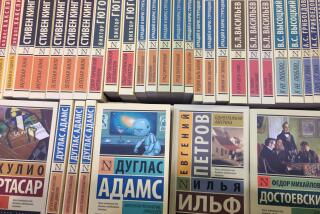In the Soviet Union, the Word Is Perestroika
- Share via
PALO ALTO — Mikhail S. Gorbachev calls it perestroika. It translates literally to “restructuring,” but the word is too thin, doesn’t give the dimension the Soviets have in mind. Perestroika, they say, means change from the foundations up--walls, wiring, floor plan, plumbing, everything.
Gorbachev is pushing perestroika night after night on Soviet television, in speeches to educational groups, at factories, in Riga, in Moscow, around the countryside. We heard about it most recently during 14 days of meetings with prominent Soviet scientists, writers, political commentators, psychologists and political scientists. Perestroika, in one form or another, was on everyone’s mind.
From newspapers, films, political appointments and speeches, from changes in regulations about alcohol and joint ventures with Western capitalism, from building incentives into salary scales at lower levels, opening of private cooperatives for profit, and even a decision to manufacture 10,000 personal computers this year and 100,000 next year, one can see objective evidence of real change.
Faced with a sagging, stagnant economy, an implacable, bureaucratic management layer, overcentralization, absenteeism, alcoholism and a dismal growth rate, the Soviet Union is in danger of becoming a third-rate economic power. “Our international policy is more than ever determined by domestic policy,” Gorbachev said in a speech to the Moscow Forum for a Non-Nuclear World, but “you have arrived in the Soviet Union at a time when . . . revolutionary changes are under way here. They are of immense significance for our society, for socialism as a whole and for the entire world.”
Last fall a new editor was appointed to the Moscow News, which promptly began to publish “real news.” “Two years ago, I never read any paper,” said a young Russian mother and teacher of psychology. “Now I do.”
The revamped News now offers differences of opinion, and even some foreign opinion. A recent edition contained an interview with former President Jimmy Carter’s national security adviser, Zbigniew Brzezinski, and a stinging Soviet reply; a report on Phil Donahue’s TV program in Moscow and a viewer’s reply to Donahue’s opinions. There was even a letter to the editor complaining about the progressive new tack. Out on the street, there were queues to buy the paper.
Pravda, the daily newspaper of the Communist Party, printed in full, in Russian, a statement by the head of the U.S. Arms Control and Disarmament Agency, Kenneth Adelman.
Not everyone understands perestroika in the same way. Novosti Press put out a pamphlet in 1986, restating the importance of Communist Party rules which “reflect the established norms . . . (and) Leninist principles of . . . democratic centralism, collectivism and internationalism.” The writer of the pamphlet, Boris Krotkov, also echoes Gorbachev in calling for “qualitative transformation of all aspects of the life of Soviet society.” But here are old ideas in new clothing, attacking U.S. foreign policy in the harshest traditional Soviet polemics.
At first blush there seems to be unanimity among Soviet writers that war is no longer an option. But when we asked several writers to go the next logical step and declare that “wars of liberation” are also obsolete, then there was a hesitation. No one is yet openly challenging the government on the difficult public-policy questions of the times--Afghanistan, arms to Nicaragua, arms to Iraq.
In the end, of course, whether Soviet changes are merely cosmetic or go to the heart and bones of the social order depends--as it does anywhere--on whether the new thinking is absorbed and validated by people themselves. Gorbachev can accelerate the beginning processes of change, but he cannot guarantee the result. And there is widespread opposition. Still, the Russians themselves are now optimistically saying that they have launched a third revolution.
More to Read
Sign up for Essential California
The most important California stories and recommendations in your inbox every morning.
You may occasionally receive promotional content from the Los Angeles Times.













